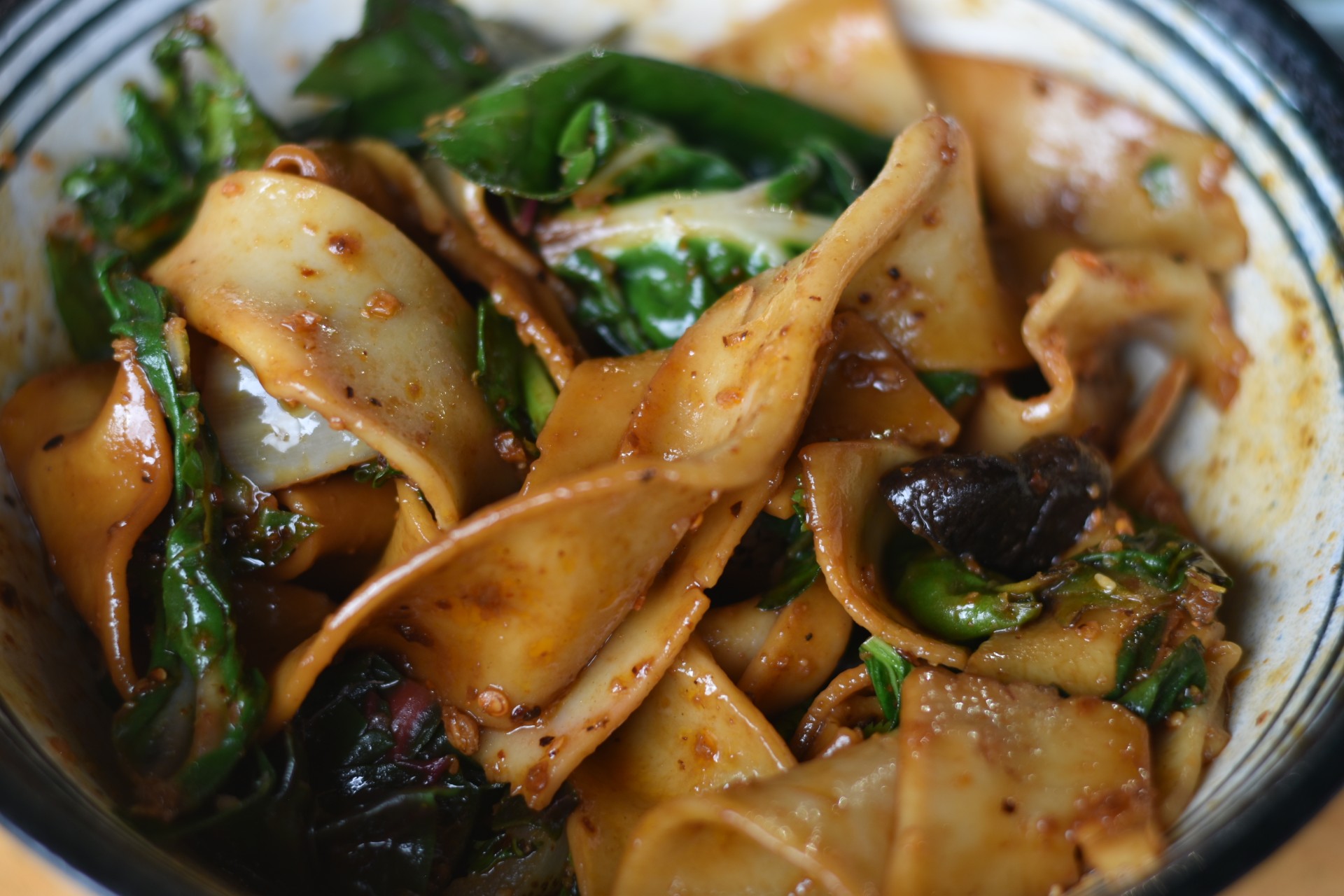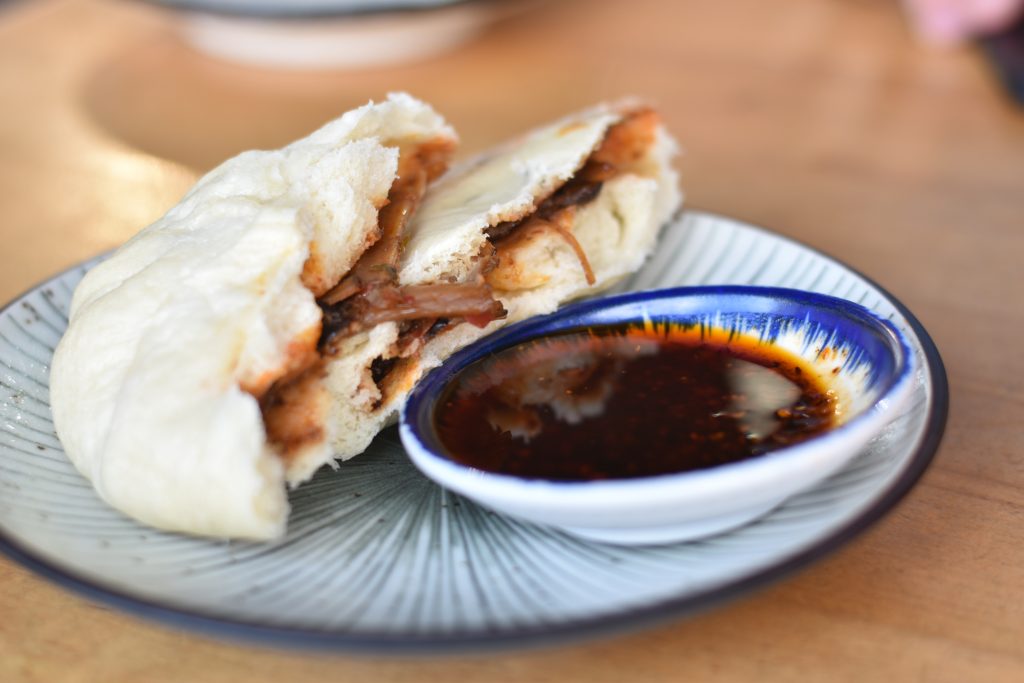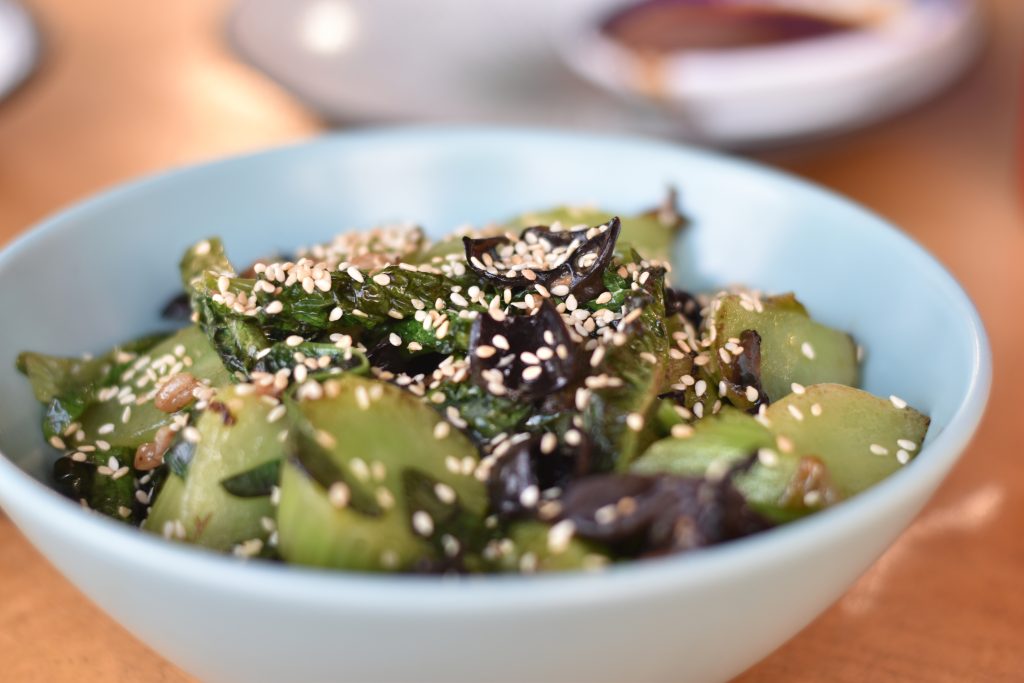
Belt noodles with wok winter greens, mushrooms, cilantro and a spicy sesame sauce.
Tuesday, April 9, 2024
By Corinna Collins
Owner and chef Justin Meddis does things the hard way at Rose’s Noodles, Dumplings and Sweets; rather than shipping ingredients from nationwide suppliers, Meddis emphasizes locally sourced food.
In a small building on N. Gregson St., Justin and Katie Meddis serve up Asian-inspired cuisine and unique pastries prepared with locally sourced ingredients. Rose’s began as a butcher and sweets shop and became a restaurant in 2017. In a phone interview on March 5, Justin Meddis explained that the food at Rose’s has always been locally sourced, from the poultry and meats, to each head of garlic.

“I did that because I knew that was right, at least I believed that was right,” Meddis said. “Using ingredients made regionally or locally and supporting the people around you.”
As Rose’s grew, Meddis and his restaurant became part of a community of local food suppliers.
“We started to have more relationships with different growers on more of a personal level. Then, it transformed to these are my friends, and these are the people I want to buy produce from and meat from and chickens from,” Meddis said.
Local produce is essential to the dishes on Rose’s menu and to the business’s reputation and function.
“Not every restaurant that sources ingredients locally does it on the scale that we do. We want to be that place that is trusted and is known for feeding people the best ingredients we possibly can,” Meddis said.
And Rose’s does exactly that; the menu features seasonal salads and incorporates vegetarian versions of popular staples, like steamed buns and belt noodles. Each season, the menu shifts based primarily on the vegetables available at the time.

“Since day one at the restaurant, what we’ve tried to instill, though not at the same level we used to, is change,” Meddis said. “That’s what Rose’s is. The menu changes all the time.
Whether it’s the drinks or the pastries or the way the noodles are prepared, things have to change.”
Though Rose’s revolves around this idea of change and is proud to serve the best possible local food, this business model does not come without challenges.
“Doing it the way we do it is not easy,” Meddis said.
Rather than source ingredients from one wholesaler, Rose’s works with eight or more suppliers at a time. These smaller, local farms can charge higher markups and increase business growth selling at market prices, as opposed to wholesale. With this in mind, Rose’s is constantly rethinking preparation based on the ingredients available at any given time. However, Meddis understands this process demands flexibility from staff.
“That’s kind of what I try to teach to the chefs we have working with us and really what I kind of pride myself on,” he said. “Buy the best of what’s local and not necessarily have a plan for it, but just use it well because it’s what we have.”
This flexibility allows Rose’s to adjust the menu based on weekly shifts in availability. This month, in particular, poses a difficult challenge when it comes to sourcing fresh vegetables, as many winter crops have reached the end of their season, while the spring season has yet to begin. One item remaining on the early spring menu is a celtuce salad served hot with wood ear mushrooms and barley.
“It’s kind of crazy,” Meddis said. “I really appreciate the trust they put in us to order a salad for $11 full of a vegetable they’ve never heard of before.”
The salad exemplifies Rose’s adaptability, as it is crafted based on the availability of locally sourced ingredients and transformed into a memorable dish by the restaurant’s quick-thinking chefs.
Rose’s utilizes a subscription newsletter to convey information about the restaurant, offering detailed insights into its ingredients and culinary techniques rather than serving as a mere news source.

“I’m the one that writes them, and, if not for anything else, it’s a way that I can voice things that I can’t say to every person that comes in here,” Meddis said. “It’s an outlet to tell our story of what’s going on.”
Meddis’s most recent email, titled “A Love Letter to Soy Tonkotsu,” explains the labor-intensive process behind each bowl of ramen. Though these letters are short, they give customers an idea of how Rose’s functions and incorporates new flavors. It’s also the best way to find out about any upcoming menu changes.
Meddis says the restaurant is looking ahead to fresh spring produce and the new menu options the season will bring.
You can read more about Rose’s and subscribe to Justin Meddis’s newsletters at www.rosesdurham.com